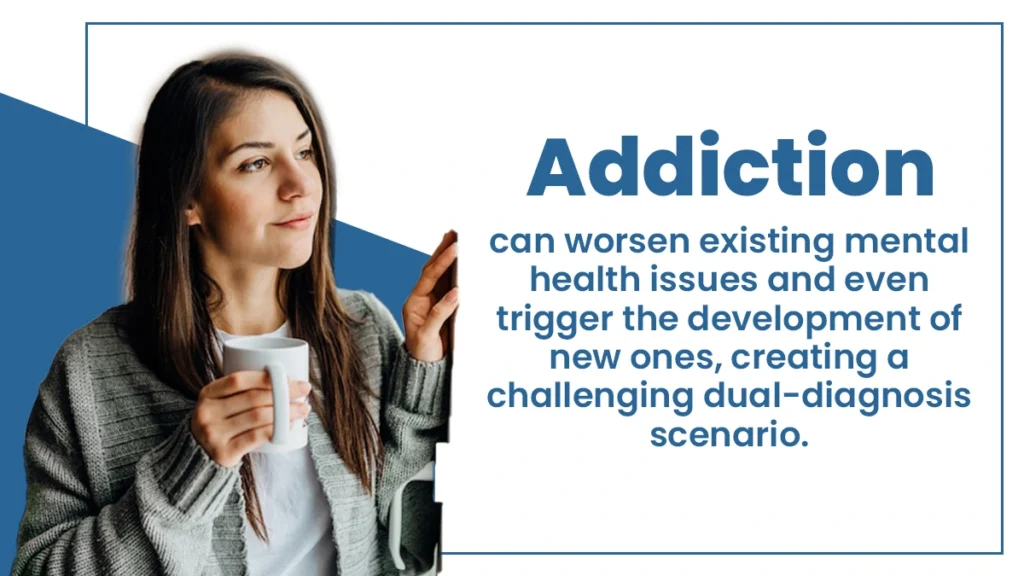Mental health and addiction often go hand in hand, as the connection between these two conditions is complex and intertwined, affecting millions of individuals across the United States.
Many individuals with mental health issues may turn to drugs or alcohol to self-medicate. Unfortunately, this coping mechanism can lead to substance use disorder (SUD). Conversely, these substances can worsen mental health problems, creating a vicious cycle.

This article will examine the deep-rooted connection between addiction and mental health, shedding light on how one can trigger or exacerbate the other. We will also explore the best treatment options for dual-diagnosis patients.
Key Takeaways
Mental health and drug use disorders often go hand in hand, affecting people of all ages, and require comprehensive solutions. Here is what this article covers:
- Mental health conditions like depression and anxiety can lead to addiction as individuals seek relief from their emotional pain.
- Addiction can worsen existing mental health issues and even trigger the development of new ones, creating a challenging dual-diagnosis scenario.
- Effective treatment for dual diagnosis involves a combination of psychotherapy, MAT, and support groups.
The Haven Detox-Little Rock provides effective addiction and mental health services. Call us at (501) 271-3342 for detailed information!
Understanding How Mental Health Drives Addiction
Mental health has a complex and multifaceted influence on drug and alcohol addiction. Various mental disorders can significantly impact a person’s susceptibility to addiction, with following mental illnesses being among the key players in this intricate dance.
Depression and Addiction
Depression, a persistent sense of hopelessness and sadness, can drive individuals to seek solace in licit or illicit drugs, which offer temporary relief. Sadly, these substances often lead to addiction, further deepening the depressive cycle. It’s like a never-ending loop, where depression fuels addiction, and in turn, addiction intensifies depression.
Anxiety Disorders and Addiction
Anxiety disorders, marked by excessive worry and fear, can also push people toward addiction as they use substances to self-medicate and alleviate their symptoms. The soothing effect of substances may provide temporary relief, but it ultimately traps them in the clutches of addiction, compounding their mental health challenges.
Bipolar Disorder and Addiction
Bipolar disorder, characterized by extreme mood swings, presents another hurdle. During manic phases, individuals may be at increased risk of engaging in harmful behaviors like substance abuse. When the depressive phase hits, they may continue using substances to cope with their low moods.
Schizophrenia and Addiction
Schizophrenia, a serious mental illness, can also intersect with alcohol and drug abuse. Some individuals with schizophrenia may turn to substances in an attempt to self-manage their symptoms, which often leads to substance use challenges.
Addiction’s Toll on Mental Health
The influence of alcohol and drug addiction on mental health is a complex and often destructive relationship. Addiction has the power to both worsen existing mental health conditions and give birth to new ones.
Addiction Worsening Mental Health Conditions
Addiction can intensify the symptoms of pre-existing mental health issues. For example, someone battling depression may find their mood spiraling deeper into despair when they become addicted to substances like alcohol or drugs. This vicious cycle can make it extremely challenging to find a path to recovery, like trying to navigate a maze in the dark.
Addiction and the Onset of Mental Health Conditions
Even more concerning is the potential for alcohol and drug use to trigger the emergence of mental disorders in previously unaffected individuals. Substance abuse can alter the brain’s chemistry and structure, potentially leading to conditions like anxiety or depression. It’s like planting seeds of distress that may sprout into a full-blown mental health crisis, leaving those affected in the midst of an emotional storm.
Exploring Dual Diagnosis Treatment Methods
Dual diagnosis, also known as co-occurring disorders, is a complex challenge where an individual faces both a mental health disorder and a substance abuse disorder simultaneously. It’s like dealing with two storms at once, making the path to recovery even more intricate.
Treating dual diagnosis demands a comprehensive approach, combining different strategies to address both addiction and mental health concerns. Here, we’ll explore several effective methods for managing this challenge.
Behavioral Therapies
Behavioral therapies, like integrated dual diagnosis treatment (IDDT), cognitive behavioral therapy (CBT), dialectical behavior therapy (DBT), and motivational interviewing (MI), are powerful tools in the fight against dual diagnosis. These therapies offer individuals new ways to manage their thoughts, emotions, and behaviors, helping them overcome the intertwined challenges of addiction and mental health.
Medication-Assisted Treatment (MAT)
Medication-assisted treatment (MAT) is another key player in dual diagnosis recovery. It involves using prescription medications to alleviate cravings and withdrawal symptoms, making it easier for those affected to focus on their mental health recovery. MAT can be a lifeline for those grappling with addiction and co-occurring mental health conditions.
Support Groups
Support groups like Narcotics Anonymous (NA) and Dual Diagnosis Anonymous (DDA) play a pivotal role in recovery. They offer a safe space for individuals to connect, share their challenges, and receive support from those who understand their unique struggles. These groups can be lifelines, offering hope, emotional support, encouragement, and accountability.
Frequently Asked Questions (FAQ)
What are the psychological causes of addiction?
Psychological causes of addiction often stem from factors like emotional pain, trauma, stress, or a desire to escape reality. These internal struggles can drive individuals to seek solace in addictive substances or behaviors.
Why is mental health important in addiction recovery?
Mental health is crucial in addiction recovery because it underpins a stable foundation for lasting change. Healing emotional wounds and managing stress and triggers are key to breaking free from drug and alcohol abuse issues.
How can addiction impact an individual’s mental health?
Addiction can strain mental health, sowing seeds of anxiety, depression, and other disorders. Like a storm, it clouds judgment, disrupts brain chemistry, and intensifies emotional struggles, complicating life’s journey.
The Haven Detox-Little Rock: Your Haven of Hope
Are you facing the battle of addiction and mental health issues? The Haven Detox-Little Rock is here to help. Our comprehensive programs support you on the path to recovery and well-being.
Our medical detox program is a crucial first step in ridding your body of harmful toxins. Our safe, inpatient treatment program offers the help and guidance you need to overcome addiction and mental health challenges, ensuring you’re not fighting this battle alone.
But that’s not all; our IV therapy is here to replenish the nutrients your body may be lacking. Your well-being is our top priority, and we’re ready to stand by your side.
Don’t wait. Call us at (501) 271-3342 today. The road to recovery begins with one step, and we are here to help you take it.



